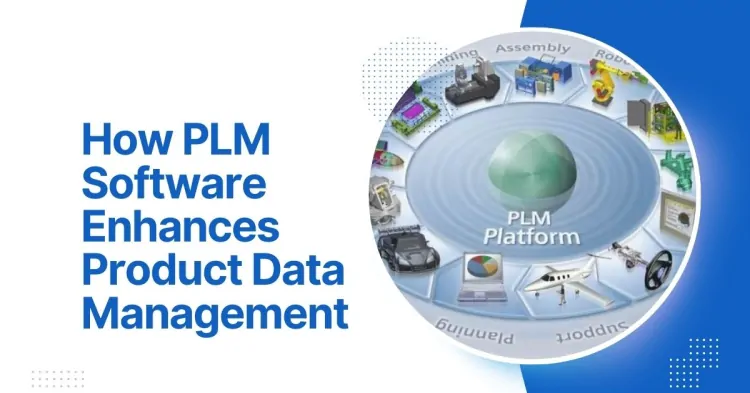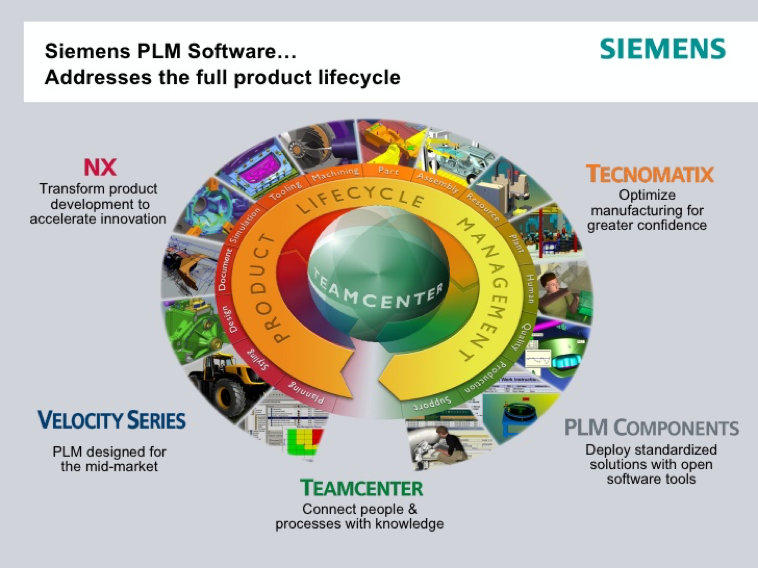How PLM Software Enhances Product Data Management
This article explores how PLM (Product Lifecycle Management) software enhances product data management for businesses. It highlights key benefits such as centralized data storage, improved collaboration across teams, better data accuracy, version control, and robust data security. PLM software also simplifies compliance and reporting, ensuring businesses stay aligned with industry regulations.

In today’s digital world, businesses are increasingly looking for ways to manage their data more efficiently. Product Lifecycle Management (PLM) software has become an essential tool for many companies to streamline their product data. It plays a key role in managing the complex information related to products, from their initial design to final delivery. In simple terms, PLM software helps businesses organize, control, and track product data in one central system. This blog will dive deep into how PLM software can enhance product data management and make operations smoother for companies.
Located in Delhi, India, DDSPLM offers third-party PLM software solutions, particularly a software called "Shop Monitoring." By using PLM software, businesses can ensure that they have accurate and up-to-date information at every step of their product's lifecycle, which is critical for smooth operations. Product data management (PDM) can become quite challenging as businesses grow, and that’s where PLM software steps in to offer a helping hand. But how exactly does this software improve the way companies manage their product data? Let’s explore.
Centralized Data Storage for Easy Access
One of the major benefits of PLM software is centralized data storage. All product-related information is stored in one place, which means there’s no need for businesses to search across multiple databases or spreadsheets. This centralized approach makes it easier for teams to access and work with the same data, ensuring that everyone is on the same page. Centralized storage reduces the risk of errors and miscommunication, which can arise when different departments use different versions of the same data.
Imagine a scenario where your team is working on a project, but the design team is using one version of the data while the marketing team is referencing an outdated version. This miscommunication can lead to costly errors. PLM software ensures that everyone, from designers to project managers, has access to the same real-time information. This eliminates the need for constant back-and-forths between teams to confirm if they are working on the correct version of the product data. By streamlining the process with centralized storage, the business saves time and avoids unnecessary confusion.
Note - Looking to enhance product data management with PLM software? Discover how DDSPLM can provide the right solutions to streamline operations, improve data accuracy, and boost collaboration across teams. Contact DDSPLM today to learn more about implementing PLM software for better product lifecycle management!
Improved Collaboration Across Teams
Another important aspect of PLM software is its ability to improve collaboration across various teams. Whether it's the design team, the engineering department, or customer support, everyone can collaborate more effectively when product data is managed efficiently. PLM software acts as a communication bridge, enabling seamless sharing of information between teams, even if they are located in different parts of the world.
When product data is easily accessible and transparent, teams can work together more effectively. For instance, the design team can quickly share updates with the sales team without needing to set up meetings or send long email chains. PLM software allows each team to access the information they need, whenever they need it, which speeds up the decision-making process. Enhanced collaboration means that issues are identified and resolved faster, and teams can move forward with confidence knowing that they are all working with the latest data. This results in improved efficiency and better outcomes for the business.

Enhanced Data Accuracy and Consistency
Maintaining data accuracy and consistency is crucial for any business. When different teams handle large volumes of data, there’s always a risk that errors may occur, especially if the data is stored in separate systems. PLM software eliminates this problem by providing a single source of truth for all product-related data. By having one unified platform, businesses can ensure that all departments are working with the same information.
Errors in product data can lead to production delays, higher costs, and dissatisfied customers. PLM software helps businesses avoid these issues by ensuring that the data is always accurate and consistent. For example, if a product design changes, the update is instantly reflected in the PLM system, and all relevant teams are notified. This reduces the likelihood of errors caused by outdated information or miscommunication. Accurate and consistent data management not only improves internal operations but also strengthens customer trust, as they receive correct and up-to-date information about the products.
Efficient Tracking and Version Control
As products go through different stages of development, it is essential to track changes and maintain version control. PLM software makes this process much easier by keeping a detailed record of every change made to the product data. Whether it’s a change in design, material, or specifications, the system tracks everything, ensuring that nothing is lost or overlooked. With PLM software, businesses can keep track of all updates and quickly revert to previous versions if needed.
Version control is especially important when multiple teams are working on the same project. Without a reliable version control system, it can be challenging to keep track of who made what changes and when. PLM software addresses this by providing a comprehensive audit trail that tracks every modification. This means that if there’s a problem, businesses can easily trace the issue back to its source and resolve it. Version control also makes it easier to comply with regulations or quality standards, as companies can provide detailed documentation of all changes made to the product data.
Better Data Security and Control
Data security is a top priority for businesses, especially when dealing with sensitive product information. PLM software offers robust security features to ensure that only authorized personnel can access specific data. With role-based access control, businesses can assign different levels of access to different teams or individuals, ensuring that confidential information stays protected.
In addition to controlling who can access the data, PLM software also provides data encryption and secure storage options to protect against cyber threats. This is particularly important for companies that deal with high-value or confidential projects. By using PLM software, businesses can ensure that their product data is secure from unauthorized access, tampering, or theft. Moreover, the system’s built-in backup and recovery features ensure that the data is safe even in the event of system failures or disasters.
Streamlined Compliance and Reporting
Complying with industry standards and regulations is an essential part of running a business. PLM software simplifies compliance by offering built-in tools to track and manage compliance data. Whether it’s product safety standards, environmental regulations, or quality certifications, the software ensures that all required data is accurately recorded and readily available for audits.
When it comes to reporting, PLM software can automatically generate reports based on the collected data, saving businesses time and effort. Instead of manually compiling data from various sources, the software allows businesses to generate reports at the click of a button. This is especially useful when preparing for audits or responding to regulatory inquiries. By streamlining compliance and reporting, PLM software helps businesses stay on top of their obligations without burdening their teams with time-consuming tasks.
Conclusion: The Role of PLM Software in Enhancing Product Data Management
In summary, PLM software plays a critical role in enhancing product data management by offering centralized storage, improving collaboration, ensuring data accuracy, and providing better security and version control. Businesses that implement PLM software can streamline their operations, improve communication between teams, and ensure that their data is always up to date and secure.
For companies like DDSPLM in Delhi, India, offering third-party PLM software solutions like "Shop Monitoring" can provide businesses with the tools they need to manage their product data more efficiently. By enhancing product data management, businesses can boost their productivity, reduce errors, and ensure compliance with industry standards. Whether you’re a small startup or a large enterprise, investing in PLM software can offer long-term benefits that lead to smoother operations and better overall performance.
For more insightful articles related to this topic, feel free to visit aboutsoul.in
What's Your Reaction?
















